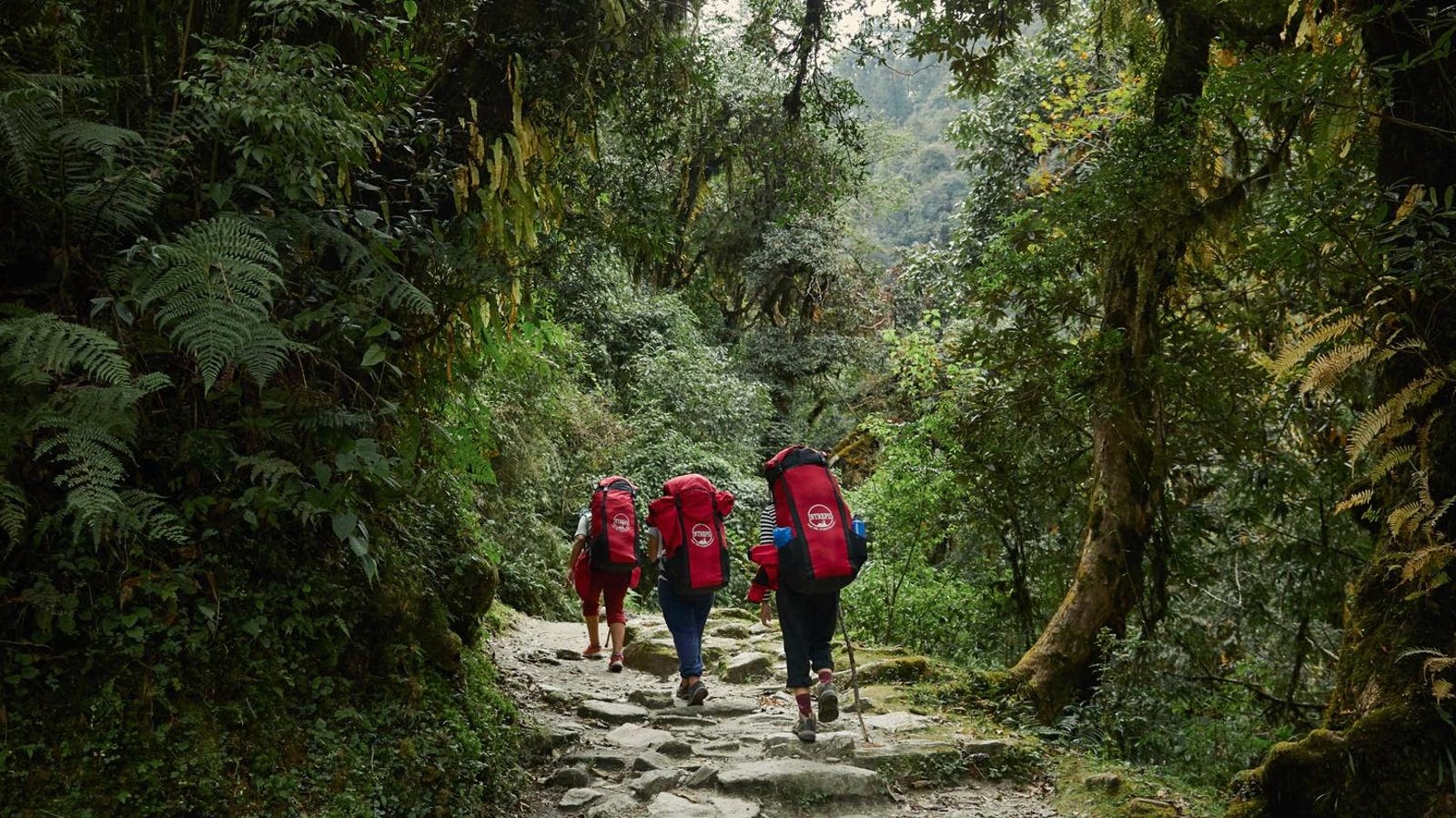Intrepid Travel prioritizes sustainability, equity, and community-driven tourism in an evolving … [+]
The travel industry is at a turning point. As concerns about climate change, overtourism, and social equity intensify, travelers are demanding more from the companies they support and making hard choices about their travel destinations. The expectation for many is clear: tourism must not only minimize harm but actively contribute to a more sustainable and inclusive world.
Intrepid Travel, a certified B Corporation since 2018, has long been a leader in responsible tourism. The company was founded in Australia, and now as it expands its presence in North America, it remains committed to proving that purpose-driven travel can be both ethical and commercially successful.
I recently spoke to Leigh Barnes, Intrepid Travel’s President of the Americas to understand how the company is integrating sustainability and inclusivity into its growth strategy—whether through eliminating short-haul flights, supporting Indigenous and women-owned businesses, or launching an expanded portfolio of guided backcountry trips in the U.S.
Furthermore, at a time when some companies are scaling back diversity, equity, and inclusion (DEI) efforts, Intrepid is doubling down. Its partnerships with organizations like Nomadness Travel Tribe and its commitment to shifting tourism dollars toward underrepresented communities reflect a broader vision: a travel industry that is not only more responsible but also more equitable. In our conversation below, Barnes discusses why travelers today expect companies to act with integrity—and how Intrepid is setting a new standard for what sustainable tourism should look like.
Christopher Marquis: I see Intrepid Travel is doubling down in the Americas. Why focus there and how will sustainability and inclusivity be incorporated within your efforts?
Leigh Barnes, Intrepid Travel’s President of the Americas
Leigh Barnes: Our vision is simple—Intrepid Travel wants to be a household name in the U.S. We’re making bold moves to bring purpose-driven travel to the center of the North American market, expanding in ways that benefit both travelers and the communities they visit.
We’re opening a Pacific Northwest headquarters to better serve North American travelers and partners, and we’re building the largest guided backcountry trip portfolio in the U.S. to meet the surging demand for active, nature-based travel. We’re also rolling out shorter, more accessible trips designed for modern explorers looking for flexibility without sacrificing depth.
Sustainability isn’t a buzzword for us, but the standard we hold ourselves to. Intrepid is now in the top tier of B Corps globally, standing alongside Patagonia as one of the world’s most impactful businesses. We’ve been carbon-neutral since 2010, but we’re going beyond offsets to cut emissions at the source. We’re investing in locally led tourism, partnering with Indigenous guides and community-based projects to ensure travel dollars stay in local economies, and eliminating single-use plastics, reducing waste, and driving conservation.
Inclusivity in adventure travel is long overdue, and we’re making sure it’s no longer an afterthought. This year, Intrepid plans to incorporate 19 new experiences supporting women across its trips.
Marquis: As opposition to DEI initiatives grows in some spaces, how does Intrepid stay committed to its values?
Barnes: Tourism has the power to change lives. While others scale back on DEI, we’re doubling down. Responsible travel isn’t just about where you go—it’s about who benefits and who gets a seat at the table. That’s why we’re investing in BIPOC creators, Indigenous suppliers, and women-owned businesses worldwide—because real impact comes from action, not empty promises. We’re here to reshape the travel economy for the better.
For example, we’ve built a partnership with Nomadness Travel Tribe, a 40,000-member community creating safe space for Black and Brown travelers. Their founder, Evita Robinson, helped shape our Ethical Marketing Guidelines in 2021, and since then, we’ve invested nearly $200,000 into mentorships, sponsorships, and grants for BIPOC creatives and storytellers. Our content collaborations have reached over 2 million people organically, with video views exceeding 3 million. But this is bigger than marketing—it’s about changing who gets to tell the stories of travel.
Marquis: Tell me more about the Intrepid Travel Foundation being set up in the United States. What will be the focus of this foundation?
Barnes: As Intrepid Travel’s non-profit, The Intrepid Foundation was created in 2002 to give travelers more opportunities to give back in the places they visit. With impact partners in over 35 countries, travelers can donate to local organizations to create a global impact. In the last 20+ years, our Intrepid Foundation community has raised more than $18 million for over 160 community partners.
In the United States, we will be a registered 501c not-for-profit in 2025 and we know this will help us make an even greater impact throughout the world. Our North American impact partners include The Grand Canyon Conservancy ,Blacks in Travel & Tourism and Water First.
Marquis: Do you find that customers care about sustainability and equity? What has been their feedback?
Barnes: Travelers today aren’t just looking for a great trip—they want to know their travel dollars are making a positive impact. Sustainability and equity aren’t just “nice to have” anymore; they’re expectations. We see this firsthand at Intrepid, as our customers actively seek out low impact, locally led experiences and are drawn to our carbon reduction initiatives, Indigenous tourism partnerships, and commitment to DEI.
The feedback has been clear: travelers want authenticity, and they’re holding companies accountable. They ask about everything—from how we support local economies to the steps we’re taking to reduce emissions. It’s why we don’t just talk about sustainability—we prove it through actions like achieving one of the highest B Corp scores in the industry, being carbon-neutral since 2010, and ensuring 34% of our global supplier spend goes to women-owned businesses.
Marquis: What trends in sustainable travel are you noticing among consumers?
Barnes: 75% of travelers say they plan to travel more sustainably in the next year, and over half are actively looking for ways to reduce their energy consumption while on the road. This shift isn’t just a trend; it’s a fundamental change in how people choose to travel. There’s a growing movement toward ‘detour destinations’—lesser-known, culturally rich places that offer deeper, more immersive experiences without the crowds or the damage of overtourism.
When tourism dollars are spent in off-the-beaten-path destinations, they fuel local economies that might otherwise be overlooked. At the same time, spreading out tourism helps relieve pressure on overburdened cities, protecting both natural environments and cultural heritage for future generations. More meaningful travel, more balanced economies, and a healthier planet—that’s the future of tourism.
Some of the places we highlighted this year in our annual Not Hot List include:
- Gilgit-Baltistan, Pakistan: This pristine mountain region, home to five of the world’s highest peaks, offers an alternative to more crowded trekking areas like Everest.
- Disko Island (Qeqertarsuaq), Greenland: Beyond Greenland’s iconic wilderness areas, Disko Island provides an Indigenous led and centered adventure with breathtaking landscapes.
- Cape York, Australia: Recently recognized by UNESCO, Cape York is gaining attention beyond its famed FWD routes.
Marquis: Since I last spoke with folks from Intrepid Travel in 2022, you were recently recertified as a B Corp. What initiatives help solidify this recognition? Why is being a B Corp important to the company?
Barnes: Travelers want companies that back up their values with real action, and at Intrepid, we’re proving that purpose and profit go hand in hand. When we first earned certification in 2018, we set out to prove that travel can be a force for good, and with our recent recertification and a record-breaking B Corp score of 102.5, we’re not just keeping up—we’re leading the charge.
This isn’t about ticking sustainability boxes but fundamentally changing the way tourism works. We were the first global tour operator to declare a climate emergency, and we’re making real, measurable changes. We’ve eliminated short-haul flights from key itineraries, invested in electric transport, and redesigned trips to rely more on hiking, cycling, and public transit. Our goal? Cut emissions in half by 2035 and reach net zero by 2050.
But sustainability isn’t just about protecting the planet—it’s about who benefits from tourism. Too often, travel dollars never reach the communities that need them most. 34% of our global suppliers spend goes to women-owned businesses—compared to just 1% for most multinational corporations. When travelers choose Intrepid, their money fuels local businesses, conservation projects, and communities in need. Being a B Corp holds us accountable—and we wouldn’t have it any other way.
Marquis: What’s next for Intrepid Travel in 2025? How will you continue to push boundaries and stick with your values?
Barnes: Intrepid is proving that purpose and profit can go hand in hand, scaling in ways that make adventure travel more immersive, sustainable, and inclusive while staying true to our values.
For the first time, we’re launching Intrepid-branded accommodations, creating stays that reflect our commitment to sustainability and cultural authenticity. We’re expanding our Pacific Northwest headquarters to better serve North American travelers and partners, and we’re building the largest guided backcountry trip portfolio in the U.S., answering the demand for active, nature-based travel in a way that puts conservation first.
But growth for the sake of growth isn’t the Intrepid way. We’re focused on sustainability and equity—cutting emissions at the source, strengthening partnerships with Indigenous and BIPOC-owned businesses, and leading the industry as a top-tier B Corp.
We’re not just following trends—we’re shaping them. 2025 is about proving that purpose-driven travel isn’t just possible—it’s the only way forward.










